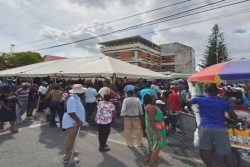Last month the Barbados government announced a new immigration policy which requires all undocumented Caricom nationals who entered the island prior to December 31, 2005, and who have remained undocumented for eight years or more, to have their status regularized. If they do not do this before December 1, they will be deported. While it has been said that those primarily affected are St Vincentians and Guyanese, one suspects that there are far more of the latter than the former domiciled in Barbados, and that they, therefore, are the primary target.
One of the problems in relation to the subject of Barbados and immigration, is the lack of hard data. Just how many foreign-born workers are there in Barbados at the present time, and what proportion of these are estimated to be illegal? How many of them are Guyanese, and in which sectors of the economy are they concentrated? Are they indeed depriving Barbadians of jobs, as is being claimed? Are the crime rates among them really higher than those of the indigenous population, as popular perception would have it, or are they fundamentally law-abiding, with just a few making the headlines with high-profile crimes? And are they really placing an intolerable burden on the education and health systems, among other things? It has even been alleged that they make up the majority of the inhabitants in the island’s squatter sites, but is this true?
Some of the language employed in some parts of the Barbados press has been emotional, with correspondents and commentators alike using words like “landslide,” “tsunami,” “overwhelming,” etc, to describe the levels of immigration, much of which they deem illegal. Members of Parliament, while generally more sophisticated in their form of expression than the letter writers in particular, have nevertheless adopted a not dissimilar tone. Minister of Foreign Affairs Chris Sinckler was reported as saying last year that Barbados would not “open the floodgates,” while Deputy Prime Minister and Attorney General Freundel Stuart made reference to the “security implications wrapped up in immigration issues nowadays.” He went on to make a highly controversial comment which admittedly had been expressed more directly elsewhere: “We have to be careful,” he was reported as saying, “about the transplantation of racial tension from one part of the Caribbean to another.” The bloggers on our website at least, did not mistake his meaning.
This wave of hostility directed towards Guyanese appears, as suggested above, to be justified by anecdotal evidence, rather than statistics. The best that this newspaper could manage in this regard, was an article by Tony Best published in the Nation in 2007, quoting figures cited by the United Nations Department of Economic and Social Affairs. He said that in 2005 (the year covered by the report), almost one in ten of those domiciled in Barbados was an immigrant, or 9.7% of the total. He went on to say that the presence of foreign-born residents had been rising since 1975, when it comprised 16,000, or 6.3% of the total. As far as overall population figures are concerned, in 1975 the total given by the UN was 246,000, and ten years later it had risen to 253,000; in 1995, it was 262,000; and by 2005 it had reached 270,000. It might be added that the CIA’s The World Factbook estimated the current Barbadian population as 284, 589, which broke down ethnically as 90% black, 4% white and 6% Asian and mixed.
While it does not follow that the increase in the Barbadian population for each of the last thirty odd years can be laid only at the door of immigration (some of it might possibly be accounted for by natural increase), nevertheless, the first UN figures quoted above for the years 1975 and 2005 would certainly confirm the public perception that there are noticeably more foreign-born residents in the island than there used to be. Whether, as indicated above, it follows from this that they have placed an intolerable strain on the island’s health, education and social services, is not something anyone appears to have attempted to demonstrate in any objective way, and similarly with all the other claims which have been made in relation to crime, etc.
What the Barbadian public has been saying about Guyanese especially, is no different from what has been said about immigrants in far larger and more resource rich societies than Barbados. In addition, anti-immigrant sentiment is always at its strongest during periods of economic downturn like now. It is not difficult to imagine, for example, that if Guyana received 50,000 nationals say, from a Latin country, there might be a similar reaction, no matter how industrious those immigrants were, or how much they contributed to the economy. And unlike Guyana, Barbados is a fairly homogeneous society, and does not have a history of immigration which would predispose it to a more relaxed attitude where accommodating outsiders is concerned.
In fairness, it has to be acknowledged that Barbados is a relatively small island, and there are genuine pressures on land, and by extension, housing. However, in this whole debate not a great deal has been said about wealthy white immigrants – many of whom just treat the island as a holiday getaway – buying up huge swathes of prime real estate, particularly in the beachfront areas. The best land in the island, one suspects, is already in foreign-born hands, and those hands are not Guyanese. But then the average Barbadian probably comes into contact with the white elite only infrequently; the fault lines are drawn between the working immigrant and the local worker, at least partly because the latter regards the former as undercutting wages, particularly in the case of illegals.
As always happens, there is no consistency in this kind of debate in other ways too. Traditionally, Barbados has campaigned for a more “humane” US immigration policy, because in that instance her citizens are the immigrants, not the hosts. Of course, the argument about the free movement of skills under the Revised Treaty of Chaguaramas has also been raised, although the Barbados Minister of Foreign Affairs has said that it does not apply in the current situation, which has come about because of “economic migration” within the region.
It is no doubt true that small states with small populations cannot absorb an indefinite number of immigrants, although what the limit is depends on a whole host of factors which may change from one period to the next. The new immigration policy in Barbados, however, is not concerned with such esoteric matters, although it has been introduced against a background of popular anti-immigrant sentiment; rather it is about the intention to deport anyone who qualifies under the amnesty but does not regularize themselves, and any others who are there illegally. Unfortunately any Caricom government has a right to apply its laws and remove undocumented foreign residents, whether Caricom nationals or otherwise. The problem really resides in how that is done, and whether the process is fair and the rules are implemented in an equitable fashion. There is ample evidence that Barbados Immigration in the past has been guilty of discrimination against Guyanese as well as maltreatment in some instances. Fears on the part of those who might otherwise seek regularization under the amnesty that they will not be dealt with in a just manner are therefore not ill founded. We can only wait and see whether in a climate of anti-Guyanese feeling the Barbadian authorities can enforce the new policy more even-handedly and professionally than they implemented the past one, which was perceived as more generous to immigrants. In addition, one would hope that the Government of Barbados would try to avoid fuelling its citizens’ disaffection with other Caricom nationals by using temperate language, and evincing a preparedness to investigate any serious allegations of injustice and mistreatment levelled against its Immigration Department.
It is not just Barbadian would-be immigrants to the US who are entitled to respect; Guyanese migrants hoping to work in Barbados are also entitled to the same, whether they are in fact admitted to the island or not.





